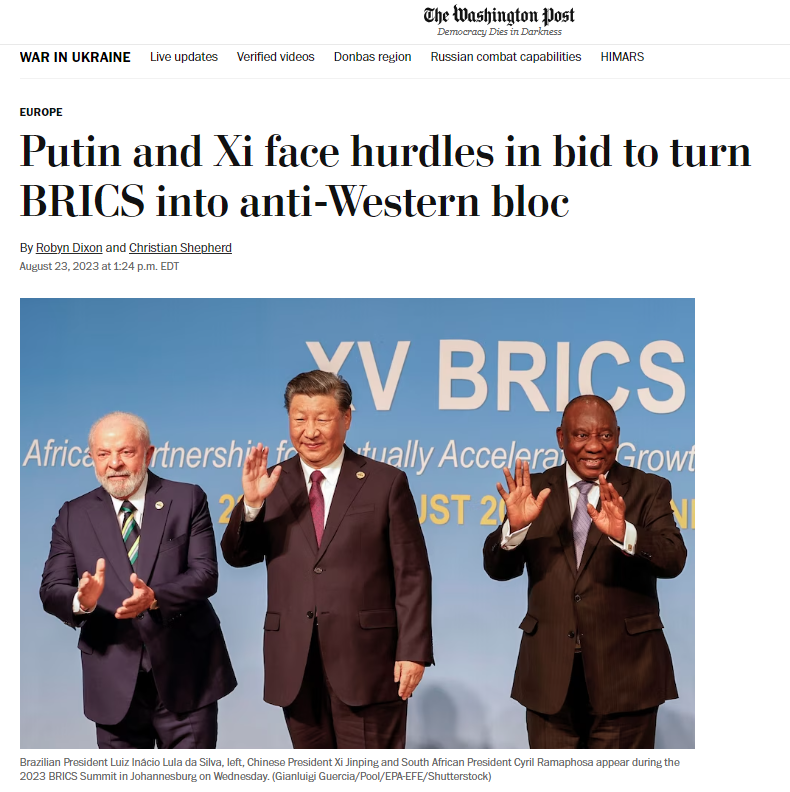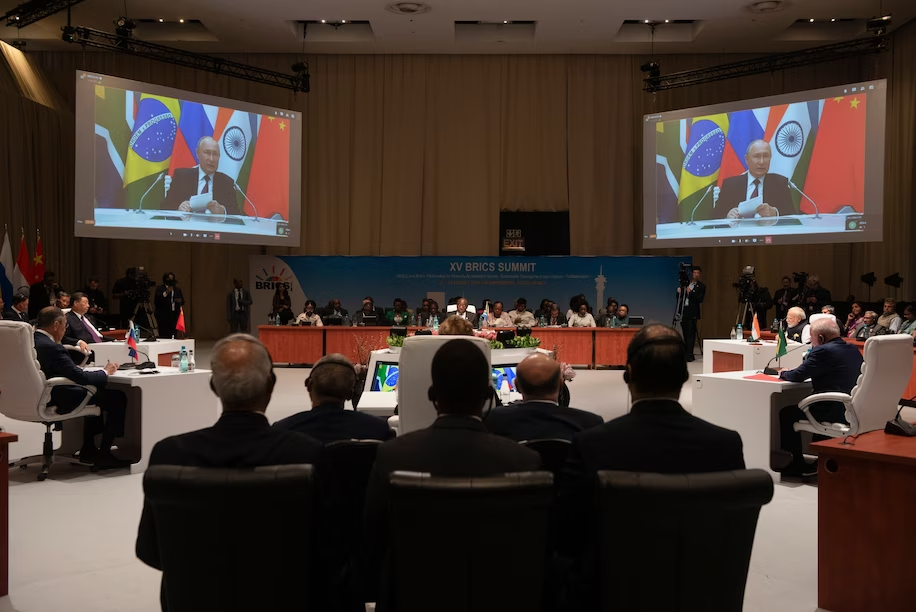Russia and China have long seen BRICS — the economic grouping of Brazil, Russia, India, China and South Africa — as central to their goal of countering Western global dominance.
LATEST INSIGHTS
Your Present Location: LATEST INSIGHTSWang Wen: Putin and Xi face hurdles in bid to turn BRICS into anti-Western bloc
Source: The Washington Post Published: 2023-08-23

On Wednesday, the planned expansion of the group was touted by China as a watershed moment on the road to a new multipolar world. But for Russian President Vladimir Putin — who has described in almost messianic terms his desire to create a new world order — the gathering highlighted his global isolation.
Indicted by the International Criminal Court over Russia’s abductions of Ukrainian children, Putin could not attend the summit held outside Johannesburg, with South Africa legally obliged to arrest him on war crimes charges. Instead, he appeared via video link, seated alone at a large white table in Moscow.
Putin, whose war against Ukraine has roiled global energy and food markets, adopted an aggrieved, defensive tone in comments to BRICS leaders Wednesday. He accused the West of “illegal” actions and “violation of basic norms,” a reference to sanctions and other measures designed to weaken Russia.
Boris Bondarev, a former Russian diplomat who resigned from Moscow’s permanent mission to the United Nations over his opposition to the war on Ukraine, said both Putin and Chinese President Xi Jinping hope to turn BRICS into an anti-Western bloc. But he said they face resistance from India and Brazil, which have stronger ties with the United States and Europe.
“Brazil or India [are] much more pro-Western,” he said. “And, of course, nobody in this bloc is willing to put themselves in the position that Russia is currently in, as an open adversary of the West and the United States, risking armed confrontation.”
While other BRICS leaders used their speeches to call for global equality, Putin’s remarks Wednesday were aimed squarely at his Western adversaries.
“We are against any kind of hegemony,” he said during the opening session, accusing his enemies of “continuing neocolonialism.”
Launching into a familiar defense of Russia’s invasion of Ukraine, he once more blamed the West, claiming it was “the desire of some countries to maintain this hegemony that led to the severe crisis in Ukraine.”
The summit’s central agenda item was the proposed expansion of the group, including how many nations could join and under what rules. Beijing’s desire to expand BRICS is part of a wider effort by Xi to remold international systems to accommodate Beijing’s interests.
Xi unexpectedly skipped the summit’s business forum Tuesday but reappeared Wednesday, calling for BRICS to accelerate its expansion and warning that the “Cold War mentality is still haunting our world.”
He said BRICS must fight decoupling, supply chain disruption and “economic coercion,” a reference to Western sanctions, as he warned of a fragile global economic recovery. Xi called for all countries to abide by the U.N. Charter and demanded that all have an equal say in the writing of international rules.
“It can’t be that whoever has the thicker arm or the loudest voice has the final say,” he said. His remarks probably resonated for much of the developing world, which often has felt pushed around by wealthier nations and excluded from the international order.
South African President Cyril Ramaphosa, the host of the summit, expressed concern about the use of global financial and payments systems “as instruments of geopolitical contestation.” Brazilian President Luiz Inácio Lula da Silva called for reducing the global economy’s reliance on the U.S. dollar as the chief reserve currency.
Indian Prime Minister Narendra Modi said he supported expanding the bloc “based on consensus,” a signal that all five leaders must endorse new members.
Dozens of nations have applied to join the group. The aspirants include Russian allies Iran and Venezuela, who also are under Western sanctions, and others including Argentina, Egypt and Saudi Arabia.
But Beijing’s push for expansion risks exposing divisions among BRICS members over the purpose and goals of the group, according to Bondarev. He compared it to the European Union’s expansion between 2004 and 2007, when it accepted new members from Eastern and Central Europe.
He said the desire of many nations to join BRICS was “just another symptom that the Global South and developing countries are searching for new instruments to raise their concerns and to be heard by the West.”
“So the West must do something, must take steps toward the Global South. And those steps should be quite convincing,” he continued.
Putin has openly scoffed at the Western “rules-based” global order — invading Ukraine, targeting civilians and energy infrastructure, imposing a Black Sea shipping blockade, stealing and destroying Ukrainian grain and deporting Ukrainians, including thousands of children, to Russia.
He sees Russia as a great power entitled to divide the world into spheres of influence, alongside the United States, China and Europe, even as he pays lip service to a fairer global order in which smaller states hold more sway.
Like Russia, China has long viewed BRICS as a useful counterweight to perceived American dominance and a way to position itself as a leader of disaffected nations.
On Tuesday, Xi called for greater representation of Global South countries in global governance and praised developing countries for escaping the “historical mire of colonialism,” in remarks delivered by Commerce Minister Wang Wentao.
He leveled accusations of hegemony and bullying at “some countries” — a thinly veiled reference to the United States and its allies.
“Whoever develops well, they want to contain; whoever catches up, they want to hinder,” Xi said.
But just as Putin’s message on global equality was undermined by his war in Ukraine, Xi’s appeal for resilience was overshadowed by a looming economic crisis at home.
Record youth unemployment, declining property sales and sluggish consumption in China have raised concerns that the world’s second-largest economy is slowing far faster than expected, a development that could derail a fragile global recovery from the pandemic.
Still, Wang Wen, a scholar at Renmin University in Beijing, said deeper coordination among an expanded BRICS bloc would “show the United States that emerging economies are determined and willing to defend their sovereignty and pursue development.”
“The goal of BRICS isn’t to oppose the United States, but its development is in itself a form of resistance,” he said.
For Konstantin Sonin, a Russian political and economic analyst at the University of Chicago, the gathering reinforced his view that BRICS remains a “superficial structure,” lacking cohesion or common goals.
“I’m not sure that there is anything that unites these countries other than the fact that 20 years ago they were all developing economies,” he said.
Key Words: BRICS, Putin, Xi
























































































 京公网安备 11010802037854号
京公网安备 11010802037854号





